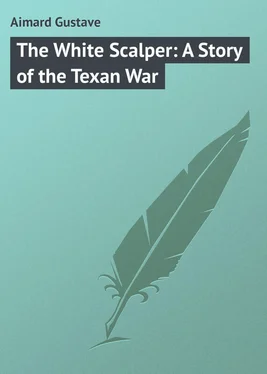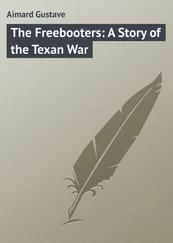Gustave Aimard - The White Scalper - A Story of the Texan War
Здесь есть возможность читать онлайн «Gustave Aimard - The White Scalper - A Story of the Texan War» — ознакомительный отрывок электронной книги совершенно бесплатно, а после прочтения отрывка купить полную версию. В некоторых случаях можно слушать аудио, скачать через торрент в формате fb2 и присутствует краткое содержание. Жанр: foreign_language, foreign_prose, на английском языке. Описание произведения, (предисловие) а так же отзывы посетителей доступны на портале библиотеки ЛибКат.
- Название:The White Scalper: A Story of the Texan War
- Автор:
- Жанр:
- Год:неизвестен
- ISBN:нет данных
- Рейтинг книги:4 / 5. Голосов: 1
-
Избранное:Добавить в избранное
- Отзывы:
-
Ваша оценка:
- 80
- 1
- 2
- 3
- 4
- 5
The White Scalper: A Story of the Texan War: краткое содержание, описание и аннотация
Предлагаем к чтению аннотацию, описание, краткое содержание или предисловие (зависит от того, что написал сам автор книги «The White Scalper: A Story of the Texan War»). Если вы не нашли необходимую информацию о книге — напишите в комментариях, мы постараемся отыскать её.
The White Scalper: A Story of the Texan War — читать онлайн ознакомительный отрывок
Ниже представлен текст книги, разбитый по страницам. Система сохранения места последней прочитанной страницы, позволяет с удобством читать онлайн бесплатно книгу «The White Scalper: A Story of the Texan War», без необходимости каждый раз заново искать на чём Вы остановились. Поставьте закладку, и сможете в любой момент перейти на страницу, на которой закончили чтение.
Интервал:
Закладка:
"Pardon me for detaining you for a moment, General," John Davis said: "but I should have liked to have a short conversation with your Excellency, prior to your departure."
"For what good object, sir?" the General answered, sharply; "did you not hear what was said in this room? Return to those who sent you, and report to them what you have seen, that will be sufficient."
"Still, General," he urged, "I should have desired – "
"What?" the General interrupted, and then added, ironically, "To make me proposals, I presume, on the part of the insurgents. Know, sir, that whatever may happen, I will never consent to treat with rebels. Thank Colonel Melendez, who was kind enough to introduce you to my presence. Had it not been for his intervention I should have had you hung as a traitor to your country. Begone! – or stay!" he added, on reflection; "I will not leave you here after I am gone. Seize this man!"
"General, take care," the American replied. "I am intrusted with a mission; arresting me is a violation of the law of nations."
"Nonsense, sir," the General continued, with a shrug of his shoulders, "why, you must be mad? Do I recognize the right of the persons from whom you come to send me a flag of truce? Do I know who you are? Viva Dios! In what age are we living, then, that rebels dare to treat on equal terms with the government against which they have revolted? You are my prisoner, sir! But be at your ease I have no intention of ill-treating you, or retaining you any length of time. You will accompany us to the mainland, that is all. When we have arrived there you will be free to go wherever you please; so you see, sir, that those Mexicans, whom you like to represent in such dark colours, are not quite so ferocious as you would have them supposed."
"We have always rendered justice to your heart and loyalty, General."
"I care very little for the opinion you and yours have of me. Come on, sir."
"I protest, General, against this illegal arrest."
"Protest as much as you please, sir, but follow me!"
As resistance would have been madness, Davis obeyed.
"Well," he said, with a laugh, "I follow you, General. After all, I have not much cause to complain, for everything is fair in war."
They went out. In spite of the dazzling brilliancy of the sun, whose beams spread a tropical heat through the town, the entire population encumbered the streets and squares. The multitude was silent, however; it witnessed with calm stoicism the departure of the Mexican army; not an effort was attempted by the people to break the cordon of sentries drawn up on the fort. When the General appeared, the crowd made way respectfully to let him pass, and many persons saluted him.
The inhabitants of Galveston detested the Mexican Government; but they did justice to the Governor, whose honest and moderate administration had effectually protected them during the whole time he remained among them, instead of taking advantage of his authority to plunder and tyrannize over them. They saw with pleasure the departure of the troops, with sorrow that of the General. The old soldier advanced with a calm step, talking loudly with his officers, and courteously returning the bows he received, with smiling face and assured demeanour. He reached the port in a few minutes, and at his order the last soldiers embarked. The General, with no other weapon but his sword, remained for some minutes almost alone in the midst of the crowd that followed him to the quay. Two aides-de-camp alone accompanied him. John Davis had already entered a boat, which took him on board the schooner, in which the General himself intended to cross.
"General," one of the aides-de-camp said, "all the troops have embarked, and we are now only waiting your Excellency's pleasure."
"Very good, Captain," he answered. He then turned to the magistrates, who had walked by his side from the cabildo. "Farewell, señores," he said, taking off his hat, whose white plumes swept the ground, "farewell, till we meet again. I pray Heaven, from my heart, that, during my short absence, you will be enabled to avoid the scenes of disorder and anarchy which the effervescence of parties too often occasions. We shall meet again sooner than you may possibly suppose. Long live Mexico!"
"Long live Mexico!" the two officers shouted.
The crowd remained dumb; not a man took up the General's shout. He shook his head sadly, bowed for the last time, and went down into the boat waiting for him. Two minutes later the Mexican flotilla had left Galveston.
"When shall we return?" the General muttered, sadly, with eyes fixed on the town, whose buildings were slowly disappearing from sight.
"Never!" John Davis whispered in his ear; and this prophetic voice affected the old soldier to the depth of his heart, and filled it with bitterness.
CHAPTER IV
JOHN DAVIS
The Mexican flotilla, impelled by a favourable breeze, accomplished the passage from the island to the mainland in a comparatively very brief period. The brig and corvette, anchored under the battery of the fort, made no move to disturb the General; and it was evident that the Texans did not suspect the events taking place at this moment, but awaited the return of their Envoy ere making any demonstration.
Colonel Melendez had seized the few boats capable of standing out to sea in Galveston harbour, so that the magistrates could not, had they wished it, have sent a boat to the Texans to inform them of the precipitate departure of the Mexican garrison. The General's resolution had been formed so suddenly, and executed with such rapidity, that the partisans of the revolution in the town, and who were ignorant of the cause of that retreat, felt singularly embarrassed by the liberty so singularly granted them, and did not know what arrangements to make, or how to enter into communication with their friends, whose position they were ignorant of. Only one man could have enlightened them, and he was John Davis. But General Rubio, foreseeing what would have inevitably happened had he left the ex-slave dealer behind him, had been very careful to carry him off with him.
The landing of the troops was effected under the most favourable conditions. The point they steered for was in the hands of the Mexicans, who had a strong detachment there, so that the army got ashore without arousing the slightest suspicion, or any attempt to prevent the landing. The General's first care, so soon as he reached the mainland, was to send off spies in every direction, in order to discover, were it possible, the enemy's plans, and whether they were preparing to make a forward movement.
The boats which had been used to convey the troops were, till further orders, drawn up on the beach, through fear lest the insurgents might make use of them. Two schooners, however, on each of which two guns were put, received orders to cruise in the bay, and pick up all boats the inhabitants of Galveston might attempt to send off to the Chief of the Texan army.
The banks of the Rio Trinidad are charming and deliciously diversified, bordered by rushes and reeds, and covered with mangroves, amid which sport thousands of flamingoes, cranes, herons, and wild ducks, which cackle noisily as they swim about in tranquil and transparent waters. About four miles from the sea, the banks rise gradually with insensible undulations, and form meadows covered with a tall and tufted grass, on which grow gigantic mahogany trees with their oblong leaves, and Peru trees with their red fruit, and magnolias, whose large white flowers shed an intoxicating perfume. All these trees, fastened together by lianas which envelop them in their inextricable network, serve as a retreat for a population of red and grey squirrels, that may be seen perpetually leaping from branch to branch, and of cardinal and mocking birds. The centzontle, the exquisite Mexican nightingale, so soon as night arrives, causes this picturesque solitude to re-echo with its gentle strains.
Читать дальшеИнтервал:
Закладка:
Похожие книги на «The White Scalper: A Story of the Texan War»
Представляем Вашему вниманию похожие книги на «The White Scalper: A Story of the Texan War» списком для выбора. Мы отобрали схожую по названию и смыслу литературу в надежде предоставить читателям больше вариантов отыскать новые, интересные, ещё непрочитанные произведения.
Обсуждение, отзывы о книге «The White Scalper: A Story of the Texan War» и просто собственные мнения читателей. Оставьте ваши комментарии, напишите, что Вы думаете о произведении, его смысле или главных героях. Укажите что конкретно понравилось, а что нет, и почему Вы так считаете.












